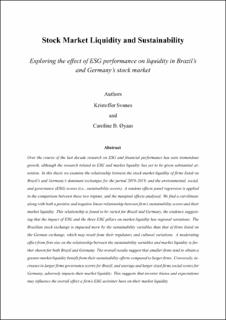Stock market liquidity and sustainability: Exploring the effect of ESG performance on liquidity in Brazil’s and Germany’s stock market
Master thesis
Permanent lenke
https://hdl.handle.net/11250/2780084Utgivelsesdato
2021Metadata
Vis full innførselSamlinger
- Studentoppgaver (Business) [1028]
Sammendrag
Over the course of the last decade research on ESG and financial performance has seen tremendous growth, although the research related to ESG and market liquidity has yet to be given substantial attention. In this thesis we examine the relationship between the stock market liquidity of firms listed on Brazil's and Germany's dominant exchanges for the period 2010-2019, and the environmental, social, and governance (ESG) scores (i.e., sustainability scores). A random effects panel regression is applied in the comparison between these two regions, and the marginal effects analysed. We find a curvilinear, along with both a positive and negative linear relationship between firm's sustainability scores and their market liquidity. This relationship is found to be varied for Brazil and Germany, the evidence suggesting that the impact of ESG and the three ESG pillars on market liquidity has regional variations. The Brazilian stock exchange is impacted more by the sustainability variables than that of firms listed on the German exchange, which may result from their regulatory and cultural variations. A moderating effect from firm size on the relationship between the sustainability variables and market liquidity is further shown for both Brazil and Germany. The overall results suggest that smaller firms tend to obtain a greater market liquidity benefit from their sustainability efforts compared to larger firms. Conversely, increases in larger firms governance scores for Brazil, and average and larger sized firms social scores for Germany, adversely impacts their market liquidity. This suggests that investor biases and expectations may influence the overall effect a firm's ESG activities have on their market liquidity.
